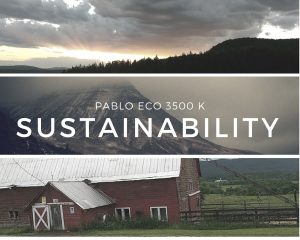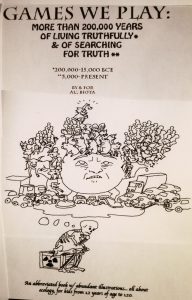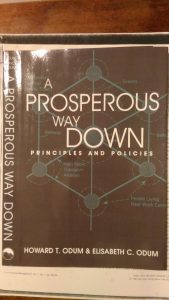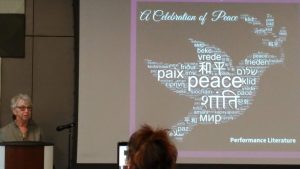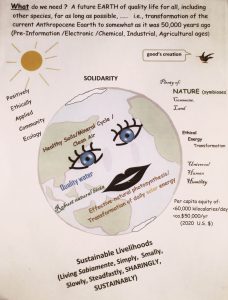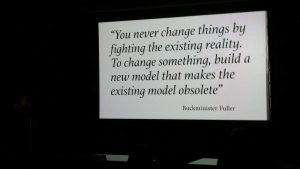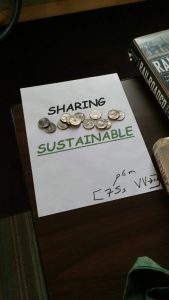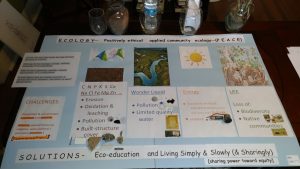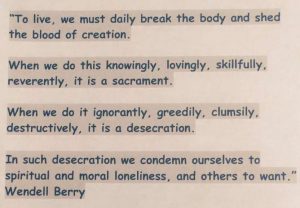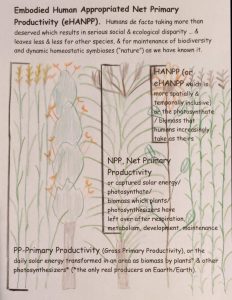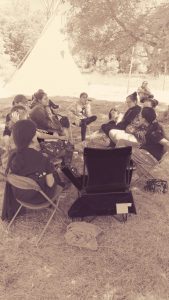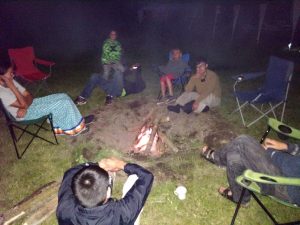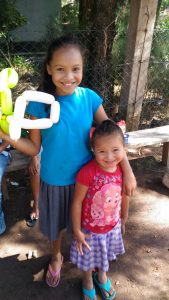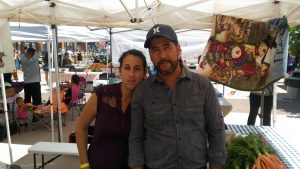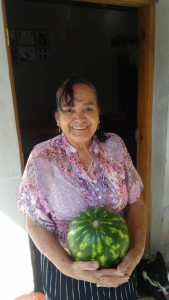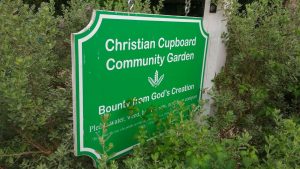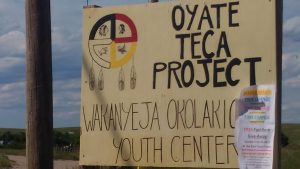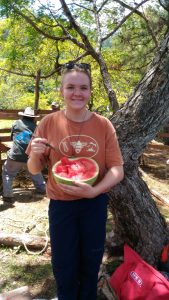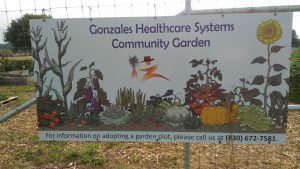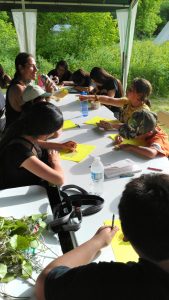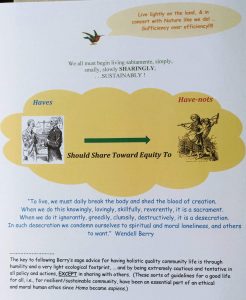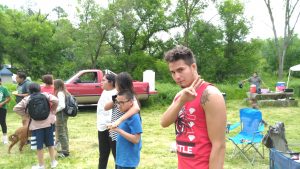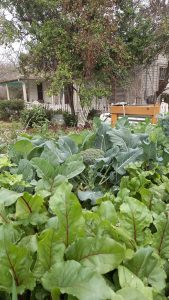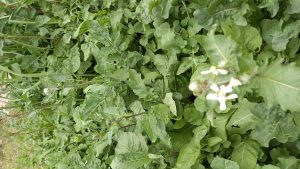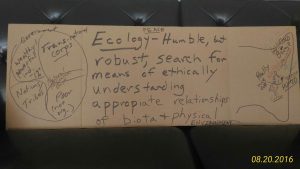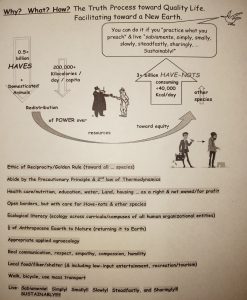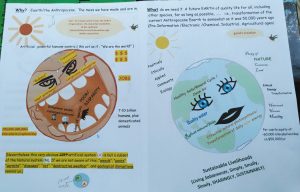PABLO ECO 3500 K
PabloEco3500K
Hola. Soy pablo martin.
My life has been based upon advocating for, promoting, and working toward regeneration & conservation of resilient, sustainable community. I believe that practicing sustainability in our day-to-day lives is vital to our 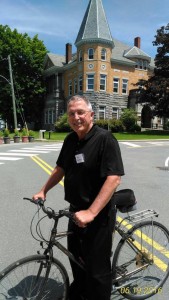 human existence.
human existence.
I invite you to join me as I embark in this once-in-a-lifetime journey. Follow me as I travel over 2,200 miles across the country, solely on my bicycle, in my efforts of facilitating learning about and promoting sustainability in community and in our lives.
My travels start in Burlington, Vermont with a final destination in Seguin, Texas. Along the way, I will be making stops in various and varied communities, meeting with local leaders, discussing challenges faced, and analyzing ways to develop and promote the work, positions, policy and actions of a “Positively Ethical Applied Community Ecology/PEACE”.
I will be meeting with a diverse group of people, and learning about and discussing new ideas on how to better protect the environment in which we live, and how to develop holistic ecological community health. I will listen to their perspective on these issues and also will be presenting and stimulating discussion of my thoughts and ideas on moving forward in the right direction. My hopes are that we might work together to shed light on a process and goal for which the “Why? What? and How?” very few know about: SUSTAINABILITY!
Places such as Plainfield and Springfield, Massachusetts, Harvard and George Washington Universities are also a few of the stops planned along my route. Through a series of Facebook, Instagram and Twitter posts, you can view the pictures and stories of my whole journey. Follow me at PabloEco3500KRide on Instagram and @PabloEco3500K on Twitter, and Paul Bain Martin on Facebook.
My Facebook page (Paul Bain Martin) and the website (paulpeaceparables.com) will serve as the foundation of everything there is to know about my journey. I hope that my intern will post: information from biographies of those with whom I am meeting, and ideas from discussions in the communities I travel through and with individuals I meet with on this trip. The website will give a full detail of where I am with shared photos of every moment on this trip (curated by OC Intern Mayra Maldonado). Gracias a todos for your time … and I hope you enjoy following me on my journey, and that you will learn something along the way about sustainability.
Abrazos,
pablo
What’s Left?
Senator Bernie Sanders is about what is right!
And what is right is possible given a system which educates ecologically and practices the principle of reciprocity. … Bernie is human, but still … He is about what is right!
………………………………………….
Hillary and John [Kasich] are too much about what is perceived–in this time–as possible. They are good statespersons, but are far too compromising and tangled up in the clutter of more, bigger, and faster, or the false hopes of conventional capitalism (which is also about more de facto disenfranchisement, more inequity, more in poverty, and more War).
Donald and Ted are about what is wrong!!!
…………………………………
¡¡¡¡¡¡Si se puede!!!!!! Please fight and push hard for what is right!
[Herein right is left.]
Bernie is about what is right. And what is right is possible!!!
https://berniesanders.com/issues/
*************************************************
[First posted during my 2415-mile bicycle-trip for Positively Ethical Applied Community Ecology/PEACE from Bernie’s city of Burlington, Vermont back to Texas.
pbm
( 7 Ss / ->^^ ) ]
Living an Ethic of Reciprocity (Simple/Slow/Small) from This First Day Until the Last of Our Days
“Simple” “Solution”
“The” solution is “simple”. Live simple, small, slow*. … But the insurmountable challenge can be basically stated as two/“too!!”:
1. There are too many people living with too much and too very many living with much too little. And there isn’t enough to go around.
2. Ecosystems, biogeochemical cycles, energetics; psychological, socio-political, and economic aspects of artificial systems; and our dynamic natural/artificial ecosphere are so complex that it is extremely difficult to develop solid & convincing arguments toward “simple, small, slow”. In addition, it is very difficult to diplomatically or otherwise wrestle power from those who have an inordinate amount and/or an improper type of power. Moreover, the power struggles also create terrible perturbations in the ecosphere.
……………………………………….
*These are the basic teachings of: many cultural/religious traditions, including BC; Jesus of Nazareth; Thoreau; Gandhi; E.F. Schumacher; the current Dalai Lama; Wendell Berry; Karen Armstrong; and many other good humans in past and contemporary societies. http://www.multifaithcouncil.org/pages/12stepssummary.pdf
*******************************************************
Below are some pertinent words on why we don’t realize “Simple/Small/Slow”:
“The only moral response, for those of us rich enough to have a choice in the matter, is to consume less of the world’s goods, to share more with those who have the least, and to leave more resources intact and a healthier planet for coming generations.” Sanders (2015) http://www.progressive.org/news/2015/12/188461/magazine-plantation-planet
“The other road, a rocky one, winds towards a future where environmentally concerned citizens come to understand, by virtue of spirited debate and animated conversation, the ‘consumption problem.’ They would see that their individual consumption choices are environmentally important, but that their control over these choices is constrained, shaped, and framed by institutions and political forces that can be remade only through collective citizen action, as opposed to individual consumer behavior. This future world will not be easy to reach. Getting there means challenging the dominant view—the production, technological, efficiency-oriented perspective that infuses contemporary definitions of progress—and requires linking explorations of consumption to politically charged issues that challenge the political imagination. Walking this path means becoming attentive to the underlying forces that narrow our understanding of the possible.” Maniates (2001) http://www.mitpressjournals.org/doi/abs/10.1162/152638001316881395?journalCode=glep#.Vnb0aFmDhyB
“October 2010 is a time of ‘unprecedented’ talk of education reform. Why are we not hearing more about what is fundamental to the education process and essential to critical thinking and quality life for all, i.e., ecological literacy and ecology-across-curricula?
We think there are at least seven reasons:
1. Ecological Illiterates. In 2010, most parents, teachers, administrators, education policymakers in the U.S. do not have real knowledge of a concept of ecological literacy (EL) and ecology-across-the-curriculum (EAC). Moreover, their grasp of EAC and EL is probably less than that of parent, teachers, administrators and policymakers in, e.g., the 1930s. (The senior author’s father, who had not attended college, and mother, who only went to school through the eighth grade, knew much more about ecological principles and processes than most folk coming out of college in today’s world.).
A good foundational knowledge in ecological principles and processes is essential to anyone even beginning to understand socio-political/economic systems and for beginning to help move us toward correcting them in an ethical manner, i.e., for the good of rich or poor–including other species–and for as long as possible.
2. Fear of Change. When folk do have an inkling of understanding of what might be meant by EAC, they often generally want to avoid it at all costs (including the costs incurred from the sacrifice of necessary ecological knowledge and actions resulting from critical thinking which would take us toward future quality living within this ecosphere). The reason for this is that their paychecks, interest rates and dividends, yields from stocks and bonds, annuities, government checks, subsidies and assistance, i.e., their relatively comfortable conventional lifestyles, depend upon the bankrupt financial system and fragile socio-economic/political structure which is perilously propped upon a deteriorating natural resource base. And they do not want to rock the boat!
The very powerful, in particular, are reluctant to give up power or even use what they have in order to gain increasing power. Moreover, many of those with power threaten those without similar power with certain job and income loss, in the event that they, the rich and powerful, should lose their own foothold on their exorbitant power.
3. Uncompassionate Apathy. Many people do not de facto care much about the three billion humans who really are struggling to get by in the world and we care even less about other species, especially if they are not mammals or are not relatively large or not stunningly beautiful.
4. Sustainability Is Difficult! (Particularly in a World of 7 Billion and Capitalism). Individuals and world systems are complex, and difficult to reprogram toward conservation and sustainability. Moreover, there are many folk who settle for the status quo, and thus there are many naysayers, cynics and con artists taking a perceived easier path, even while their actions are nudging, shoving or leading us over the cliff..
5. Communication Barriers. It is extremely difficult to even begin to communicate with folk who hold a completely different system of values, especially when these values are on a compellingly attractive and even addictive (yet unfounded) ‘foundation.’
6. Faster Horses! Older Whiskey! Younger “Mates”! More Money! We generally continue to worship at the altar of growth and big, fast and noisy, and technological and artificial, (and energetically and socio-economically/ecologically costly) … at the expense in particular of ‘average’ students/people.
7. Problems in Knowing When the Well Really Is About to Run Dry. As human populations and their appetites and their technology increase, the finite resources of this finite planet are rapidly tapped into and utilized. But to some extent, everything seems fine up until the depletion of necessary resources (especially macronutrients/essential elements & compounds) is precariously near. It is difficult to know and predict when the last amount of life-essential resources are nearing depletion until very near the end of depletion (or near the point where it is virtually energetically impossible to secure them in sufficient amounts to maintain the homeostasis of life systems). [Dr. Albert Bartlett eloquently and thoroughly discussed this in 1978 in his Forgotten Fundamentals of the Energy Crisis www.npg.org/specialreports/bartlett_index.htm ]
(Certainly there have been better analyses of barriers to sustainability, e.g., www.pambazuka.org/en/category/comment/61837 www.viewpointlearning.com/publications/reports/BC_sustainability_0306.pdf ; however, the seven barriers listed are significant.)” martin et al. (2010) Paper presented at the 33rd Annual Conference of the Society of Educators and Scholars, Oct. 2010
Some Alton and Louise Martin Family Christmas Stories (ca. 1946-66 and beyond) by paul b. martin, 69 yrs-young, oldest of 6 brothers & sister
As with members of many families and communities I suppose, I do not believe the odds are that I could have been raised in a much better family or community than the Alton & Louise Martin family and Devine, Texas. And life was particularly sweet around Christmas time!! (It wasn’t perfect and could have been improved upon. However, humans and Eaarth considered, I am happy with the way it played out.)
I do believe if more lived a life of Alton and Louise Martin (frugal, honest, disciplined, humble, prudent, loving, simple/small/slow), the world would be a much better place and community would be more sustainable. They lived an ethic of reciprocity as well as most—especially in the sense of a light ecological footprint, and a sort of peasant agrarianism.
Christmas was in many ways lived in the same way as Alton and Louise lived other times of the year. Chores had to be done, we ate fantastic food, purchases/consumption by family was kept to a minimum, we participated in church/community by attending Catholic services and midnight Mass, etc., we worked hard and we played hard, and there was a very spiritual umbrella to all of life.
My First Memories of Christmas. I suppose going to Mass and a Christmas tree with a few gifts under it are my very first vague memories of Christmas. Prior to moving from the family farm in the Stockdale area to Devine in 1952, I do slightly remember some Masses we attended in Nixon with our cousins the Demmers (I distinctly remember their 1940s black car!), and gatherings at Grandmother Eva Martin’s at the big house close to where FM 1107 and SH-123 meet (across from Possum Clark’s little gas/food/misc. business).
The first concrete memory which was at least close to Christmas, was during the winter of 1949. Dad Alton brought in a newly born calf and placed it in front of the Dearborn butane-gas space heater, and he rubbed it earnestly to get it warm and back to life. Later as he went out to take care of the animals, he playfully and nimbly ran and skipped on the icy ground as brother Lawrence Alton and I peered out the north window at him.
Perhaps during another year, but before we moved to Devine, or before 1952 [and perhaps before 1951, since I don’t remember brother John Russell (born ‘51) being around], I remember Lawrence and I getting play rifles for Christmas. I had a nice colorful Hopalong Cassidy rifle which made a shooting noise when the trigger was pulled. However, I coveted Lawrence’s pop-shotgun furnished with corks which could be shot at the ceiling.
I clearly recollect one chilly but beautiful winter day shortly after Christmas when Dad, with his Winchester pump-22 (which he may have inherited from Grandpa Martin, and which we learned later could fire repeatedly like Chuck Connors in The Rifleman), and Lawrence and I went for a hunt in the post oak pasture across the road and west from our house. I remember Dad teaching us that before going through the fence in a safe manner, we should always place our rifles securely against a fence post rather than try to cross with the rifle in hand.
Later Years. It was in the early evening before midnight Mass on Christmas eve that Santa Claus always came to the Alton and Louise Martin house. This was the time our immediate family received and shared gifts. The ritual would be for Dad to take us [myself, Lawrence, John Russell, Charlie (b. ’52) and Kenny (b. ’53)] for a ride in the car to see local Christmas lights. And amazingly, after we got back we’d find that ol’ St. Nick had arrived. (We never caught Mommy kissing Santa Claus!!)
After Mass on Sundays–during the Holidays or during any time of the year–we would get the Light newspaper at George Vernon Scott’s ice/convenience store. (The San Antonio Express and News was always delivered to our home daily!) Reading the newspapers was always a joy for me, and it was so especially during the Holidays when I could really digest them.
I was often challenged in the winter with tonsillitis up until Dr. Myers of Hondo yanked out my tonsils and adenoids. During a bout with an upper respiratory infection and tonsillitis in my early years, I had to stay home while Dad took the rest out to see the Holiday lights. That’s when the childhood fantasy of Santa Claus got blown away as I helped Mom be Santa Claus. [Since I’ve mentioned my Christmas illness, I want to mention that brother Kenny really suffered with serious asthma attacks during his early years. And because he was allergic to the natural evergreen Christmas trees, we began using an artificial tree after Kenny was in his early years in the mid-1950s.]
In general we did get relatively very few gifts—i.e., clothes made by Mom, play structures crudely made by Dad, and a couple of inexpensive toys when we were very young. Exceptions were years when we got very nice gifts of tinker toys and kid-building materials for constructing imagined structures. Moreover, Lawrence and I did get tricycles for one Christmas, and prior to moving to Devine in 1952, he and I—with straw hats “a top” our heads–were in the Stockdale Watermelon Jubilee parade pulling watermelons in wagons behind our tricycles.
During junior high and high school days I remember Christmas pageants and caroling on nicely landscaped and decorated areas at the corners of old SH-81 and 173 in downtown Devine. And I also remember the lovely incense, Mrs. Ehlinger’s organ playing, and songs/chants in Latin at High Masses during some days of the Holiday season. https://www.youtube.com/watch?v=Swns4Kjzc9E https://www.youtube.com/watch?v=NyV01zXuW-A https://www.youtube.com/watch?v=2bosouX_d8Y
I can distinctly remember Mom holding a foot-scraper out of bottle-caps nailed to a ca. 3X4 foot board she made for Aunt Jo Bailey Martin … out in the back of our house in Devine (which was located close to where the Triple-C Restaurant now stands, or truly more at the access road there south of SH-173 and west of IH-35). We eight Alton & Louise Martins lived in a very small 2-bedroom house, and Uncle Peggy and Aunt Jo Bailey (and sometimes cousin Helen Bain) lived in a house ca. 3X the size of ours. I have to admit that as I viewed that foot-scraper Mom had lovingly made and worked so hard on, I felt it was not enough for Aunt Jo Bailey. [I do wish to inject here that with his various agricultural enterprises, the Devine Mill and Elevator (later Tri-County Co-op), and his spread of a large yard and fruit trees, Uncle Peggy did provide many jobs and other agricultural experiences for me, my Dad, and my brothers!! Moreover, he was the one who first suggested that I study agricultural entomology!!!]
During this Christmas season and others, Dad would sometimes take firewood to an old man who lived near the feed mill in a small hovel made largely of cardboard, but with a wood stove. I helped Dad with this several times and for this reason I mention it; however, I know he helped others in this way also.
It was always great to have visitors during Christmas. On some occasions when they spent the night with us, they simply accommodated themselves by sleeping on the floor of our little home, with assistance from us with blankets, sheets and pillow!
[During visits from Uncle Pete & family, Mom’s oldest brother, Uncle Pete would show many, many slides of his families travels throughout the (mostly western) U.S. This was one of our first introductions to much of “the rest of the world” … although we would often quiz each other from very young times about places on U.S. & world maps–and the globe, and Mom’s youngest brother, Uncle Bernard would regularly send us magazines on Alaska, where he did construction in the Army during WW II. … I must mention that as the hour approached 9 pm–even if Uncle Pete was just getting started on his lengthy presentation, Dad would announce, “We’ve got work to do starting early tomorrow, and I don’t know about the rest of you, but I’m going to bed!!”
Dad was going to bed by 9 pm, no matter who was around, the President, the Pope, his best friend, his favorite grand kid, … . … My brother Lawrence went to bed by 9 pm also, and brothers Charlie and Kenny generally hit the hay at that hour also. ]
At times during the Holiday season, Lawrence, myself and Dad might get invited to go deer hunting at the Outlaws in the Black Creek/Yancey area, the Neumanns over near Kyote, or on Arthur Ehlinger’s Father-in-Law’s (Mr. Ernest Sadler’s) place out in the Big Foot area I believe. I never got a deer (until I married Betsy Hoffmann and hunted on the Hoffmann’s place), and generally just froze my butt off in a tree or on the ground. Lawrence did get one with Tucker Irwin’s long Japanese rifle at the Neumann’s, and Dad shot a doe once on Mr. Sadler’s place despite the pleas of Arthur for Dad not to shoot. (As I recollect, that was the last time my father was invited to hunt with Arthur.)
I really do not have memories of any truly notable gift that I received for Christmas. Perhaps the BB-guns could have been very special, but we had to share them with brothers. (I suppose what I least liked about Christmas was hearing of all the wonderful bunch of gifts my friends got for Christmas when we went to Mass.) …
We did purchase quite a few fireworks—and especially firecrackers—during the holiday season. Shooting them off at night and in the day was lots of fun!
Moreover, we did oftentimes receive silver dollars from special relatives and friends, and that was truly special. (I sometimes wonder where these silver dollars went? Perhaps we put them in our Medina Valley State Bank accounts, which Dad has us open early in our formative years.)
We would also have fun playing games during the Holidays—tag, hide-and-seek, and as we got older we would play lots of baseball and football, but mostly football. (After we went off to college, and even married, and then came home for the Holidays, we began playing some tennis.)
But MOST DEFINITELY what I most liked about Christmas was Mom’s super-great food, and going to Grandma Martin’s!!
We are what we eat—mentally, physically, spiritually—and hands down Mom’s cooking was what I enjoyed most about Christmas. My favorite was her date nut loaf! However, the ham and/or turkey; canned green beans and corn from our garden; Mom’s ambrosia (with oranges, apples, pecans, coconut, and fresh sweetened cream; all of which I could never get enough); great yeast rolls; pumpkin, sweet potato, and pecan pies; and sweet potatoes (baked minus extra crap like marshmallows/brown sugar/cinnamon/citrus juice/etc. and simply served with our milk cow’s butter) were also super delicious and nourishing. The eggnog in the big open bowl which we made as kids with Mom from our milk cow’s cream and our chickens’ fresh eggs (and nutmeg and rum flavoring added) was to die for. Moreover, sometimes we also had some of Lupe Hernandez’s tamales made from one of our hogs’ heads, and they were super-rica!!
Finally, when food from Devine’s past is discussed—for any season!!!—one has to mention Mr. Wooten’s bakery—located just southwest of where the current library and civic center is in Devine. Mr. Wooten’s donuts, and even moreso his jelly rolls, were the absolute best! I have never eaten bakery sweets that matched Mr. Wooten’s. They were soooooo delicious!!!
At Grandmother Eva Martin’s house in Stockdale (after my early years, she moved to a small house and lot almost directly across from the big Baptist Church), we were away from immediate work and could explore her little house and yard, her shed, the dry creek beside her house, and even Stockdale. We generally stayed for much of a day during Christmas Holidays, and oftentimes cousin Wanda Jo would be there, and cousins Michael McLennan, Martin Teague, Helen Bain and Bill Martin and their parents (my uncles and aunts) would stop in for a short while. We generally ate food brought in by the family; however, Grandma could whip up a fantastic cake with icing drizzled over it—from scratch without measuring—in a moments notice!
[I am going to add one final story on Grandma Eva Martin. … During my college days during one Holiday period (and it may or may not have been around Christmas), I slowly cooked on a pit of mesquite and oak-coals, some really, really great barbequed beef. The complex sauce of butter & onions, vegetable oil, vinegar, brown sugar, ketchup, mustard, and Worcestershire sauce I prepared was delicious … but I also basted the beef with some beer I was drinking while doing the barbequing. … And the final cooked product was truly very, very good.
I decided to make a trip over to Stockdale to see Grandma Martin whom I hadn’t seen in a while. And I took along some of my recently cooked barbeque. … After arrival and our initial visit, I broke out the barbeque and Grandma deliciously munched into the tender and wonderfully-sauced treat. You could tell with the look on her face that she truly appreciated & loved my special gift to her!
But then I made the stupid mistake of stating to my adamant teetotaling Protestant Grandma–the lovely Mrs. Eva, “Yep Grandma! I used some beer as a final touch in the preparation!!” She quickly blurted out, “I knew there was something wrong with that meat!!!!”
And she didn’t eat another bite.
Nevertheless, we had a great visit.]
……………………………
*And food commonly contributes as the largest component of our ecological footprint.
Live Like the Poor: Pact of the Catacombs, the Meaning of Human Existence, Technology, Frost’s The Road Not Taken, and Truth*
My original idea for this blog site was to do very short, succinct and light, but thought-provoking, stories based on “facts” with links to substantive scientific knowledge, and with illustrations by my more artistic wife. With help perhaps I will eventually get there before I pass.
If I had been born with a silver spoon in my mouth, had I had my education paid for by my family; had I been formed in a more urban environment; had I been sheltered from the tough realities of racism, homophobia, religious intolerance, industrial agriculture, conventional capitalism and development, guns and War (All things are relative; arguments could be made that indeed all of these did occur for me.); if I had bought into: dogma, the superstition of religion; if I constantly listened to most current AM talk radio and Fox “News”/Commentary; had I accepted conventional pseudo-conservatism and capitalism …
these paulpeaceparables-blog posts would of course be much different.
These blog posts of mine, and this one in particular, are/is informed by experiences from:
1. a very simple, disciplined and good man, Alton Martin, and his basic conservatism, frugality, utilitarianism, pragmatism, and sense of place and community ;
2. what was a mostly rural community of Devine, Texas with some considerable racism and tribalism;
3. Pope John the 23rd; the sixties, civil unrest, and the Vietnam Conflict;
4. Dick Ridgway and biological control; and E.J. Dyksterhuis and range ecology;
5. David Pimentel and energetics;
6. Jim Hightower’s Texas Department of Agriculture;
7. yesterday’s (11/28/15) This American Life, No. 573 “Status Update” http://www.thisamericanlife.org/radio-archives/episode/573/status-update .
…………………………………………………………………….
I. Live Like the Poor. We are in a state of overshoot relative to carrying capacity and there is dreadful inequity in the world. … What are we going to do about this?
I agree with the Pact of the Catacombs and liberation theology that bishops and all of us should live like the poor. We need to work toward sustainability (social justice, humaneness, and ecological sanity) and equity for all humans and other species. http://www.npr.org/sections/parallels/2015/11/26/456376586/pope-francis-emphasis-on-poverty-revives-the-pact-of-the-catacombs This is the ethic of reciprocity … in a holistic sense and at its very core! (This ethic has been around in cultures, schools of philosophy, religions from since ancient times. Nevertheless we continue to have much to learn about truly realizing it in practice in community.)
II. Meaning of Human Existence. From The Meaning of Human Existence, E.O. Wilson, with whom I generally and mostly agree:
“We are not predestined to reach any goal, nor are we answerable to any power but our own. Only wisdom based on self-understanding, not piety, will save us. There will be no redemption or second chance vouchsafed to us from above. We have only this one planet to inhabit and this one meaning to unfold. To take this step in our journey, to get hold of the human condition, we need next a much broader definition of history than is conventionally used.”
“… we are still part of Earth’s fauna and flora, bound to it by emotion, physiology, and, not least, deep history. It is folly to think of this planet as a way station to a better world. Equally, Earth would be unsustainable if converted into a literal, human-engineered spaceship.
Human existence may be simpler that we thought. There is no predestination, no unfathomed mystery of life. Demons and gods do not vie for our allegiance. Instead, we are self-made, independent, alone, and fragile, a biological species adapted to live in a biological world. What counts for long-term survival is intelligent self-understanding, based upon a greater independence of thought than that tolerated today even in our most advanced democratic societies.”
“Do we really want to compete biologically with robot technology by using brain implants and genetically improved intelligence and social behavior? This choice would mean a sharp departure away from the human nature we have inherited, and a fundamental change in the human condition.
Now we are talking about a problem best solved within the humanities, and one more reason the humanities are all-important. While I’m at it, I hereby cast a vote for existential conservatism, the preservation of biological human nature as a sacred trust. We are doing very well in science and technology. Let’s agree to keep it up and move both along even faster. But let’s also promote the humanities, that which makes us human, and not use science to mess around with the wellspring of this, the absolute potential of the human future.”
“ … understanding creates the dilemma: whether to stop the destruction for the sake of future generations, or the opposite, just to go on changing the planet to our immediate needs. If the latter, planet Earth will recklessly and irreversibly enter a new era of its history, called by some the Anthropocene, an age of, for, and all about our one species alone, with all the rest of life rendered subsidiary. I prefer to call this miserable future the Eremocene, the Age of Loneliness.”
“Earth, to put the matter succinctly, is a little-known planet.” … “It is based on the misconception that taxonomy is a completed and outdated part of biology.” … “The exploration of biodiversity has few friends in the corporate and medical world.” … “It is an inconvenient truth of the environmental sciences that no ecosystem under human pressure can be sustainable indefinitely without knowing all of the species that compose it, which commonly number in the thousands or more. The knowledge coming from taxonomy and biological studies dependent upon it are as necessary for ecology as are anatomy and physiology for medicine.”
“Without nature, finally, no people.”
“Unfortunately a religious group defines itself foremost by its creation story, the supernatural narrative that explains how humans came into existence. And this story is also the heart of tribalism. No matter how gentle and high-minded, or subtly explained, the core belief assures its member that God favors them above all others.” … “Faith is biologically understandable as Darwinian device for survival and increased productivity.” … “ … they [a great many educated citizens] understand the rule attributed to the Roman stoic philosopher Seneca the Younger that religion is regarded by the common people as true, by the wise as false, and by rulers as useful.” … “Faith is the one thing that makes otherwise good people do bad things.” … “In America, for example, it is possible in most places to openly debate different views on religious spirituality—including the nature and even the existence of God, providing it is in the context of theology and philosophy. But it is forbidden to question closely, if at all, the creation myth—the faith—of another person or group, no matter how absurd.” … “Dogmas forced on believers, he [philosopher Soren Kierkegaard] said, are not just impossible but incomprehensible—hence absurd.” … “ … some problems can never be solved, only outgrown. And so it must be for the Absolute Paradox. There is no solution because there is nothing to solve.”
“I don’t believe it too harsh to say that the history of philosophy when boiled down consists mostly of failed models of the brain.”
“Human beings are not wicked by nature. We have enough intelligence, goodwill, generosity, and enterprise to turn Earth into a paradise both for ourselves and for the biosphere that gave us birth. We can plausibly accomplish that goal, at least be well on the way, by the end of the present century. The problem holding everything up thus far is that Homo sapiens is an innately dysfunctional species. We are hampered by the Paleolithic Curse: genetic adaptations that worked very well for millions of years of hunter-gatherer existence but are increasingly a hindrance in a globally urban and technoscientific society.” … “Too paralyzed with self-absorption to protect the rest of life, we continue to tear down the natural environment, our species’ irreplaceable and most precious heritage. And it is still taboo to bring up population policies aiming for an optimum people density, geographic distribution, and age distribution. The idea sounds “fascist,” and in any case can be deferred for another generation or two—we hope.”
“In a nutshell, individual selection favors what we call sin and group selection favors virtue.”
III. Technology. “Technology makes us forget what we know about life.” Sherry Turkle in Reclaiming Conversation http://www.pbs.org/newshour/bb/how-your-cellphone-is-silently-disrupting-your-social-life/
IV. Story of Our Lives.
“’The Road Not Taken’
By Robert Frost
Two roads diverged in a yellow wood,
And sorry I could not travel both
And be one traveler, long I stood
And looked down one as far as I could
To where it bent in the undergrowth;
Then took the other, as just as fair,
And having perhaps the better claim,
Because it was grassy and wanted wear;
Though as for that the passing there
Had worn them really about the same,
And both that morning equally lay
In leaves no step had trodden black.
Oh, I kept the first for another day!
Yet knowing how way leads on to way,
I doubted if I should ever come back.
I shall be telling this with a sigh
Somewhere ages and ages hence:
Two roads diverged in a wood, and I—
I took the one less traveled by,
And that has made all the difference.” http://www.poetryfoundation.org/poem/173536
“The poem isn’t a salute to can-do individualism,” … “It’s a commentary on the self-deception we practice when constructing the story of our own lives.” [David Orr, author, The Road Not Taken] http://nypost.com/2015/08/16/the-famous-robert-frost-poem-weve-read-wrong-forever/ http://www.pbs.org/newshour/bb/weve-gotten-wrong-robert-frost-classic/ http://thedianerehmshow.org/shows/2015-08-20/the-100th-anniversary-of-robert-frosts-poem-the-road-not-taken
V. Truth. Homo sapiens will definitely fizzle out eventually. Therefore does a goal/process of conservation and development of sustainable community, Simple/Small/Slow, positively ethical applied community ecology … really mean anything? Of course I strongly believe it does. The reason for life and species, and including viruses and prions, is an effort to keep their effective genes/proteins/life entities in the universe.
Truth? I suppose for me it is/has become:
1. my friend and loved one, Betsy; grand kids and kids; other family and friends and loved ones;
2. Dynamic homeostatic symbioses or “nature” (such as it remains and as I know it in my life time) and community in an ecological sense;
3. science and a quest for knowledge and productive work in that quest; healthy recreation that is mostly in concert with family, community in the ecological sense, Nature, The Land, a healthy, sustainable Commons.
4. realization of humility, communication, knowledge, wisdom and prudence toward quality of life for as many as possible for as long as possible.
VI. I Am the Way, the Truth, and the Life. In “We Hear You”, The Progressive, October 2015:
“Was Jesus Generous?
In the first paragraph of his article in the May issue (‘A Pacifist Protest Against the Peaceful Drone’) Wendell Berry extols Jesus’s ‘unquestioning generosity to the poor.’ Berry sees no imperfections in his religious hero—only moral supremacy.
Nevertheless, I am not convinced. First of all, to be generous one has to have something to give (such as money, food, or shelter). Someone who offers only love or encouragement or a blessing to the needy may be a nice person, but certainly not a generous one. If, for example, a hungry man approaches me for help, and I say to him, ‘I’ll pray for you,’ am I showing generosity? Of course, not!
As implied in Luke 9:58, Jesus had plenty of nothing—and the Gospels mention repeatedly that nothing was plenty for him. He even exhorted his disciples not to crave worldly goods or seek creature comforts, but to put their trust in God for their needs (Luke 12:22-34). So, how could Jesus be generous if he had nothing to be generous with?
Perhaps Berry was thinking about Matthew 15:32-38, where Jesus miraculously feeds thousands of people with seven loaves of bread and a few fish. But that incident, in my opinion, still misses the mark about Jesus/s generosity.
Let’s reflect on it: If Jesus was a God with unlimited powers, he could have fed every hungry person on Earth, not only his own groupies. If I (or Berry, I’m sure) had the miraculous ability to feed every hungry person on the planet, we would. But if we gave food only to those who glorified us, we’d be exhibiting not generosity but only self-centered concern about our own importance.
–David Quintero
Monrovia, California”
…………..
“To live, we must daily break the body and shed the blood of Creation. When we do this knowingly, lovingly, skillfully, reverently, it is a sacrament. When we do it ignorantly, greedily, clumsily, destructively, it is a desecration. In such desecration we condemn ourselves to spiritual and moral loneliness, and others to want.” Wendell Berry
__________________________________________________
*What Maury Maverick used to call succotash.
pbm
[ 7 Ss / VV->^^ ]
Concrete and Greens: Viewed in the Bus Station MCDonald’s in Downtown Dallas
Baby spinach from El Valle Central.
What tries to pass for bacon from imprisoned animal intellects of Carolina.
A bit of reconstituted poultry from Georgia.
Way too much plastic from the Saudis.
Maybe more than 30 kilocalories invested for less that one ingested.
Even less digested. (And metabolized???)
Un poco de vitaminas y minerales. ¡Pero muy caro!
And the toothless young lady of these concrete streets begs.
……………………
pbm
7 Ss / VV->^^


